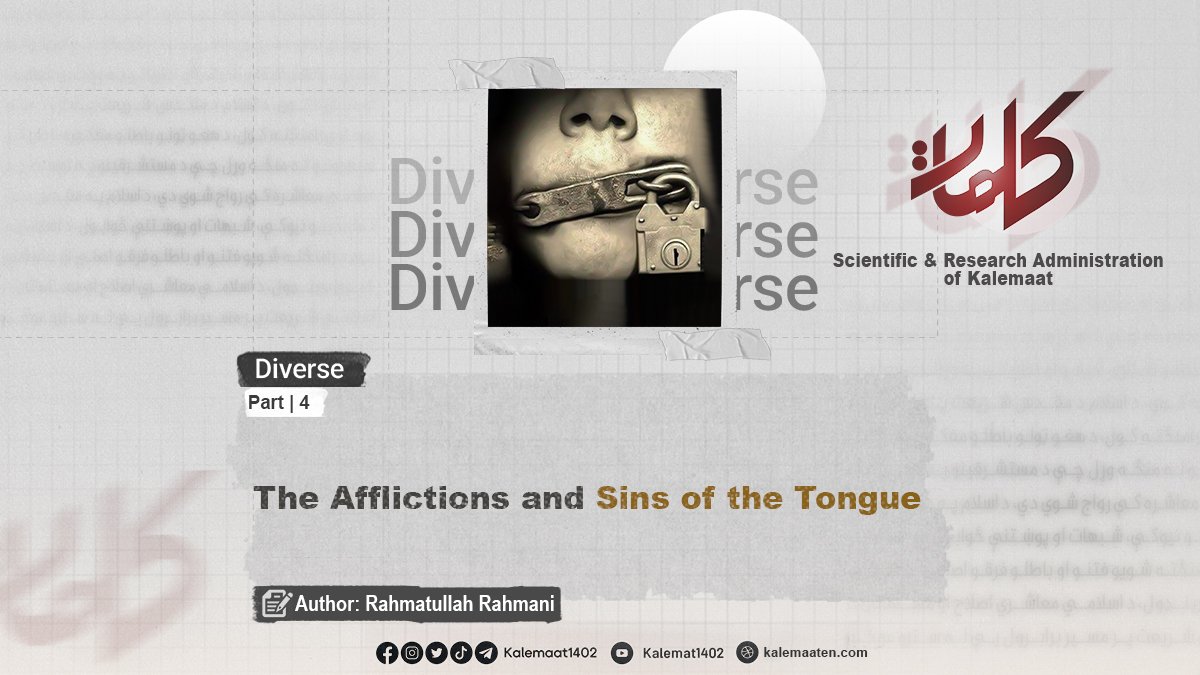Author: Rahmatullah Rahmani
The Afflictions and Sins of the Tongue (Part Four)
Fourth Calamity: Argumentativeness and Disputing
What is meant here is debating over forbidden matters that occurred in the past or might possibly occur in the future. Among the things the Prophet (peace and blessings be upon him) forbade is what he said: «لَا تُمارِ أَخَاكَ، وَلَا تُمازِحْهُ، وَلَا تَعِدْهُ مَوْعِدًا فَتُخْلِفَهُ» Translation: “Do not argue with your brother, do not joke with him inappropriately, and do not make a promise to him only to break it.” [1]
In another narration, the Prophet (peace be upon him) said: «ذَرُوا الْمِرَاءَ فَإِنَّهُ لَا تُفْهَمُ حِكْمَتُهُ وَلَا تُؤْمَنُ فِتْنَتُهُ» Translation: “Abandon disputation, for its wisdom is incomprehensible, and its tribulation is inevitable.” [2]
Sayyiduna Umar (may Allah be pleased with him) said:
“Do not seek knowledge for three purposes:
1.Do not seek knowledge for the sake of argumentation! – That is, your intention behind acquiring knowledge should not be to engage in disputes with others.
2. Do not seek knowledge to corrupt the people!
3. Do not seek knowledge for show or pretentiousness!”
“And do not abandon knowledge for three reasons:
1.Do not abandon knowledge due to shyness! – One should not be shy in acquiring knowledge; rather, one must be diligent and serious in learning.
2. Do not abandon knowledge due to excessive asceticism!
3. Do not abandon knowledge because your content with ignorance and assume you don’t need to learn!” – When you fail to understand a topic and find it difficult to learn, don’t give up; keep striving, for Allah never lets anyone’s effort go unrewarded.
Some individuals are always seeking an opportunity to show off their knowledge in gatherings, displaying their intellect and boasting before others. Thus, they open the doors of disputation with meaningless and contentious discussions, causing confusion among many people. We must understand that debate aimed at defeating others and silencing opponents—driven by ego and desire to flaunt knowledge—is the source of all traits and behaviours condemned by Allah Almighty, though praised by Satan.
Just as if a person were given a choice between drinking wine and committing other major sins and chooses wine thinking it less serious—only to be drawn into further sins as a result—similarly, if a person becomes obsessed with defeating others in arguments, this craving may lead him to publicly commit all forms of evil.
One must realize that improper disputation and argumentative behavior involve twelve serious afflictions, all of which are condemned in sacred law:
1. Rejection of Truth
A person who engages in vain disputes often refuses to accept truth and logical reasoning, insisting instead on his own ignorance—even when others present clear and sound evidence. Rejecting truth is a form of arrogance, and disputation naturally leads to such behavior.
2. Ostentation and Hypocrisy
One of the major afflictions of disputation is showing off—seeking public approval and striving to gain people’s attention. Such a person is, in the eyes of Islam, a hypocrite. Hypocrisy is explicitly condemned in both the Qur’an and Hadith. It is a spiritual disease—terrifying, chronic, and deadly.
3. Malice and Hatred
Another affliction of improper disputation is resentment and hatred, which are rooted in anger. When someone holds onto anger, it festers inside and manifests as malice and animosity. These traits lead to envy, cursing misfortunes, social withdrawal, severing family ties, slander, backbiting, revealing people’s secrets, indecency, mockery, and harm through words and actions. All of this lowers one’s spiritual status and distances one from divine favor.
4. Anger
Anger is another dangerous consequence of vain disputes. The disputant often cannot avoid falling into rage, especially when his argument is challenged, his speech is criticized, or his reasoning is publicly rejected. In such cases, anger is inevitable. Allah Almighty and all His prophets (peace be upon them) condemned all forms of anger, especially when driven by ego and baseless partisanship.
5. Envy
Another harmful outcome of disputation is envy, which is born out of malice and hatred. Disputants are rarely safe from envy—whether they win or lose, whether their arguments are praised or dismissed, they often wish the recognition and honor were theirs. This desire implies a wish that the other party be deprived of divine blessings—this is envy in its purest form.
6. Social Alienation
Distancing oneself from others is another result of resentment. As hostility intensifies in a debate, and each party claims to be right while accusing the other of falsehood, anger arises—and with anger comes separation and the end of affection. When love disappears, only hatred and division remain.
Continues…
[1] Sunan` al-Tirmidhi, “Chapter: What Has Been Reported Concerning Disputation,” Hadith No. 1995
[2] Al-Mughni ‘an Haml al-Asfar fi Takhrij ma fi al-Ihya’ min al-Akhbar by ‘Abd al-Rahim ibn al-Husayn al-‘Iraqi, Vol.



